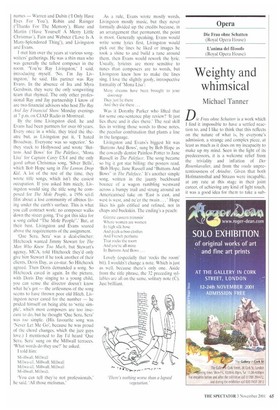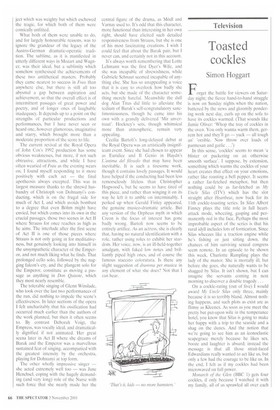Op e ra
Die Frau ohne Sehatten (Royal Opera House) L'anima del filosofo
(Royal Opera House)
Weighty and whimsical
Michael Tanner
Die Frau ohne Schauen is a work which I find it impossible to have a settled reaction to, and I like to think that this reflects on the nature of what is, by everyone's admission, a strange and complex piece, at least as much as it does on my incapacity to make up my mind. Seen in the light of its predecessors, it is a welcome relief from the triviality and inflation of Der Rosenkavalier, and from the vou/u unpretentiousness of Ariadne. Given that both Hofmannsthal and Strauss were incapable, at any rate at this stage in their joint career, of achieving any kind of light touch, it was a good idea for them to take a sub
ject which was weighty but which eschewed the tragic, for which both of them were comically unfitted.
What both of them were unable to do, and for largely honourable reasons, was to ignore the grandeur of the legacy of the Austro-German dramatic-operatic tradition. The sublime, as it is manifested in utterly different ways in Mozart and Wagner, was their ideal, but a sublimity which somehow synthesised the achievements of these two antithetical masters. Probably they came nearest to success in Frau than anywhere else, but there is still all too abysmal a gap between aspiration and achievement, so that the overall effect is of intermittent passages of great power and poetry, and of longer ones of laughable inadequacy. It depends up to a point on the strengths of particular productions and performances, but I have never seen or heard one, however glamorous, imaginative and starry, which brought more than a moderate proportion of the score to life.
The current revival at the Royal Opera of John Cox's 1992 production has some obvious weaknesses, but more, if not such obtrusive, attractions, and while I have often wearied of Frau as the evening wears on, I found myself responding to it more positively with each act — the final apotheosis always excepted. This was in largest measure thanks to the shrewd husbandry of Christoph von Dohnanyi's conducting, which is on the frugal side for much of Act I, and which avoids bombast to a degree that even Bohm might have envied, but which comes into its own in the crucial passages, those two scenes in Act II where Strauss for once reaches as high as he aims. The interlude after the first scene of Act II is one of those pieces where Strauss is not only going in for meditativeness, hut genuinely looking into himself in the unsympathetic character of the Emperor, and not much liking what he finds. That prolonged cello solo, followed by the nagging falcon's cry, and the plangent solo for the Emperor, constitute as moving a passage as anything in Don Quixote, which they most nearly resemble.
The tolerable singing of Glenn Winslade, who took over the last two performances of the run, did nothing to impede the scene's effectiveness. In later sections of the opera I felt uncharitably that his ossification had occurred much earlier than the authors of the work planned, but then it often seems to. By contrast Deborah Voigt, the Empress, was vocally ideal, and dramatically dignified if not animated. Her great scena later in Act II where she dreams of Barak and the Emperor was a marvellous sustained feat of singing, accompanied with the greatest intensity by the orchestra. playing for Dohnanyi at top form.
The other wholly impressive singer — she acted extremely well too — was Jane Henchsel, coping with the hugely demanding (and very long) role of the Nurse with such force that she nearly made her the
central figure of the drama, as MOdl and Varnay used to. It's odd that this character, more functional than interesting in her own right, should have elicited such detailed responsiveness from Strauss, but she is one of his most fascinating creations. I wish I could feel that about the Barak pair, but I never can, and certainly not in this account.
It's always worth remembering that Lotte Lehmann was the first Dyer's Wife, and she was incapable of shrewishness, while Gabriele Schnaut seemed incapable of anything else. She has so unappealing a voice that it is easy to overlook how badly she acts, but she made of the character something merely hateful. Meanwhile the dull dog Alan Titus did little to alleviate the tedium of Barak's self-congratulatory sanctimoniousness, though he came into his own with a grandly delivered Mir anvertraut'. Hockney's sets, though whimsical more than atmospheric, remain very appealing.
Cecilia Bartoli's long-delayed debut at the Royal Opera was an artistically insignificant event. Since she had chosen to appear as Euridice and II Genio in Haydn's L'anima del filosofo that may have been inevitable. It is such a tiresome work, though it contains lovely passages. It would have helped if the conducting had been less remorselessly lifeless than Christopher Hogwood's, but he seems to have tired of this piece, and rather than winging it on its way he left it to amble on interminably. I perked up when Gerald Finley appeared. the genuine musico-dramatic article. But any version of the Orpheus myth in which Creon is the focus of interest has gone badly wrong. Bartok now seems to be entirely artifice. As an actress, she is clearly that, having no natural identification with a role, rather using roles to exhibit her stardom. Her voice, now, is an ill-held-together amalgam, with faked low notes and brilliantly piped high ones, and of course the famous staccato coloratura. Is there any slight suggestion of dramma per rnusica in any element of what she does? Not that I can hear.



















































































 Previous page
Previous page